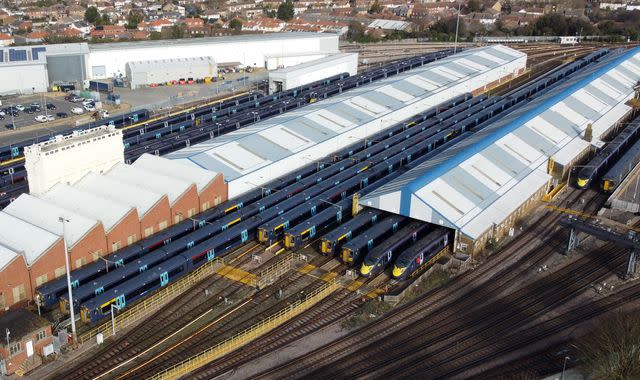Strikes take toll on economy as widespread disruption forces many to stay at home

Britain is experiencing its biggest day of industrial action for more than a decade, with up to half a million people walking out across the country.
Civil servants, train drivers, teachers and border force staff are all taking part in co-ordinated strike action to appeal against real-terms pay cuts - wage levels that fail to keep up with the rate of inflation.
It has led to widespread disruption across the country, with thousands of schools closing their doors and footfall plummeting across the country's high streets.
The strike action is expected to cost the economy close to £100m, according to economists at the Centre for Business and Economic Research (CEBR).
This figure includes £68m of direct costs linked to lost working days in the railway and education sectors, as well as the civil service.
Economists said that absences among those who cannot work from home and rely on the train network to commute to their place of work will cost the economy an additional £26m.
"These figures (together £94m) represent a lower bound estimate, as they do not capture impacts such as parents taking time off work during school closures, reduced retail/hospitality footfall, among others.
"It will, however, mark the costliest day of action across the whole of the eight-month current strike period," the CEBR said.
About 85% of the 23,000 state schools in England and Wales are closed or partially closed today, with parents forced to stay at home as a result.
Data submitted, by schools, to the Department for Education showed that 45.9% of all schools in England were estimated to be fully open.
Of the rest, 44.7% were open but restricting attendance.
High street businesses were also reeling from falling footfall.
According to the data company Springboard, footfall across retail centres across London was down 16.5% compared to last week and down 9.2% in other cities across the UK.
Diane Wehrle, Insights Director at Springboard, said: "Once again the rail strikes occurring across the UK today are having a significantly adverse impact on footfall across retail destinations, but particularly in high streets, with the most severe impact being felt in large cities which comprise the largest working populations where many have chosen to work from home."
Read more:
Strikes on course to expand and escalate this year without compromises
In a further sign of reduced economic activity, congestion on the roads fell significantly, with many parents staying at home instead of dropping their children to school or going to work.
The sat nav company TomTom said that traffic at the 9am peak was down 43% in Liverpool and Bristol, compared to the same time last Wednesday.
Traffic was down 40% in Cardiff, 31% in Sheffield, 27% in Manchester, 24% in London, 22% in Birmingham and 19% in Glasgow.
On the London tube network, the number of entries and exits up until 10am this morning was down 23% on last week to 1.39 million, while bus usage was down 18% to 1.12 million journeys.
Andy Marchant, a traffic Expert at TomTom, said: "As half a million workers go on strike across the UK today, shutting down rail lines and schools, TomTom data has shown that congestion during this morning's rush hour has fallen significantly from its usual levels.
"Our data suggests that workers have become accustomed to the disruption and are planning their commute accordingly or are staying at home altogether, heeding the advice to avoid any unnecessary travel and brace for significant disruption to their daily lives."


